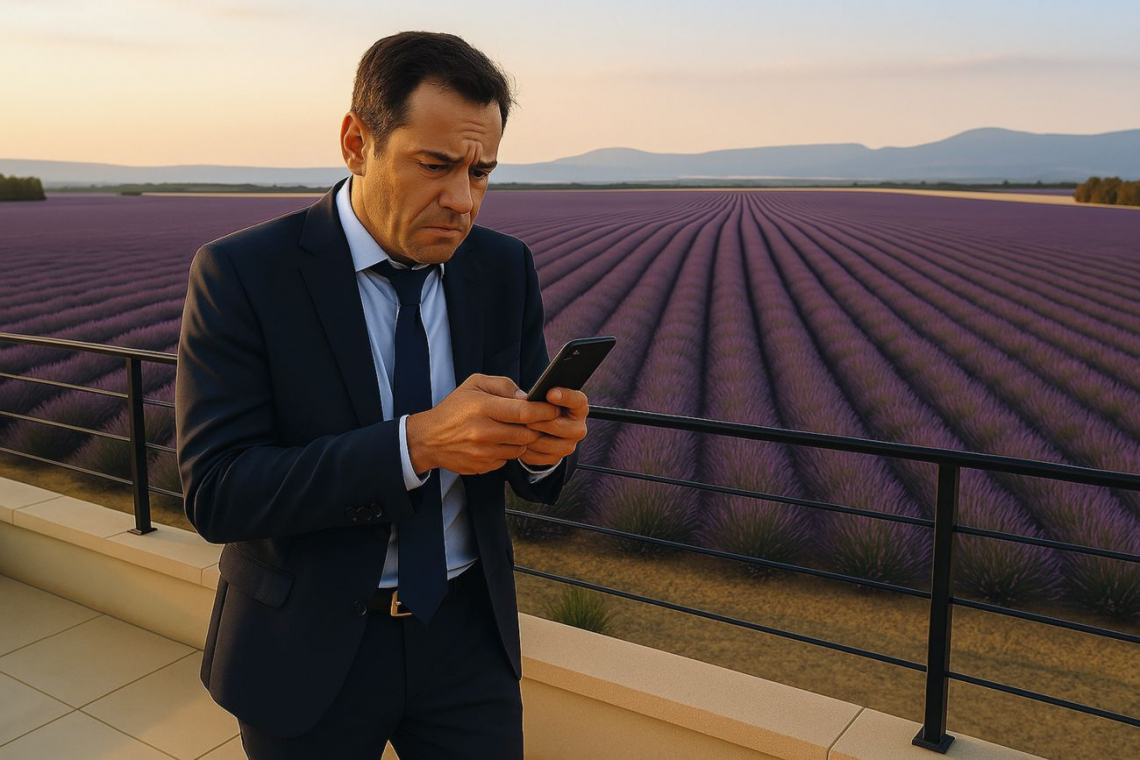There are those moments when everything suddenly stands still. At least on the outside. The phone doesn't ring. The email inbox remains quiet. The calendar is empty - or at least emptier than usual. It's actually the moment that many managers have been working towards for weeks: Vacation at last. Finally out. Finally take a deep breath.
Really?
Because something frightening often happens: Your head can't keep up. Thoughts continue to circle. And even by the pool in Tuscany, while birds are chirping in the morning on Amrum or between mountain peaks in the Allgäu, this pressing feeling remains: Is my team doing the tasks properly? What if Mr. XYZ calls, this very important customer who just wants to talk to me? What if the power goes out? What if the electroplating burns down? Then you realize with a shock: I'm still in the middle of it!
One managing director told me: "I was sitting in a beautiful, secluded vacation home in the middle of the olive groves in Provence - but I wasn't there. My body was on vacation. My head, on the other hand, was in crisis mode. Because my team and my customers called me at least once a day. And I picked up the phone!"
This phenomenon is widespread - and often a symptom of the fact that the boundaries between responsibility and overload have long since become blurred.
When leadership becomes a reaction
In many organizations, the understanding of leadership has recently come under pressure. New regulations, a shortage of skilled workers, political uncertainty, global crises and, at the same time, the increased expectation of flexibility, communication and presence are putting decision-makers under pressure.
What used to be forward-looking planning is now turning into daily crisis management. What used to be strategy has mutated into a reaction to external demands.
The situation is serious - which is precisely why hope is needed
Many people think of "hope" as wishful thinking, rose-tinted spectacles or the principle: "It'll work out."
But that falls short.
Hope is not a random feeling, but an inner attitude that can be consciously cultivated - and a strategic management tool. Because hope opens our eyes to opportunities. It focuses on the scope for action, even when everything seems to be getting tighter on the outside. And it is an important source of strength for remaining capable of acting when uncertainty becomes a permanent state.
Managers who anchor hope in their attitude
- concentrate on what they can influence
- act in a solution-oriented manner instead of focusing on problems
- give their team security through presence and clarity
Thinking in scenarios instead of brooding
Many decision-makers are currently experiencing: fear blocks. It makes us hold on, wait, hesitate. But leadership needs clarity. And clarity comes from perspective, and a proven approach is to work with realistic scenarios.
Three questions help us to get back into action:
- What is the worst likely scenario - and how could we deal with it?
- What would be the best possible outcome - and what would it take to achieve it?
- What small steps can we take today to get us moving?
Because those who are prepared remain calm. And those who recognize options can make decisions with greater certainty - even in turbulent times.
Structure creates stability - even under pressure
In addition to an inner attitude, external structure is also required. Many managers fail not because of the complexity of their tasks, but because they lack a systematic approach to decision-making.
What really helps: Easy-to-implement decision-making guidelines that provide orientation in everyday life - for yourself and for the team.
This includes
- Clarity about what belongs on your own desk: not every decision is a matter for the boss. If you consciously delegate, you take the pressure off yourself - and develop competence in the team.
- Leadership based on principles rather than individual cases: Example: "I make decisions over 30,000 euros. Below that, my team decides according to defined criteria." Such rules create speed and trust.
- Speed before perfection: Not every decision has to be perfect - but it should be made promptly. If you wait too long, you lose opportunities.
Hope makes leadership effective
When you integrate hope as an attitude into your day-to-day leadership, you not only change your inner perspective - you change the atmosphere in which your team works: You create trust. You provide orientation. You keep room for maneuver open, even when things get uncomfortable on the outside.
Because leadership does not mean knowing everything. Leadership means being able to make decisions - and remaining calm in the process.
PS: By the way, if you'd like to know how I managed to get by without a cell phone during a vacation, you can find out more in my podcast episode #23. Let me surprise you!


